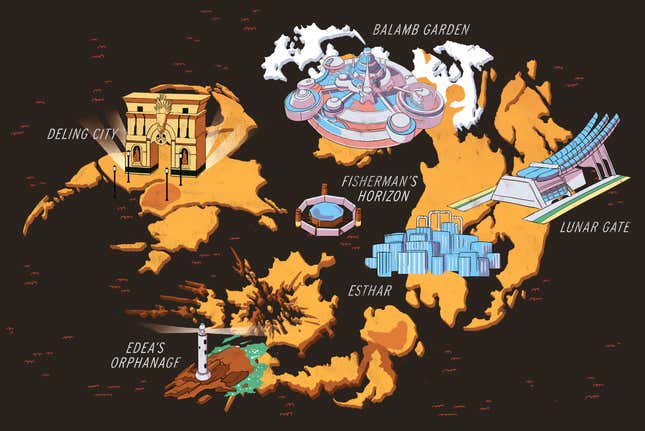
How do you follow the biggest role-playing game of all time? How do you look at Final Fantasy VII and make something even better? If you’re Square in the 1990s, the answer is simple: You break everything.
This is part eight of Kotaku’s Final Fantasy Retrospective, in which we take a look back at every mainline FF game.
Final Fantasy VIII, released in 1999, wasn’t just a sequel to FFVII. It was an evisceration. It tore apart and reimagined the series’ mechanics to a degree we hadn’t seen since Final Fantasy II. Instead of buying weapons from stores, you’d craft them through recipes you’d find in magazines. Instead of powering up your characters through levels, you’d boost your stats by equipping magical spells. Instead of gaining those spells through books or magical crystals, you’d steal them from enemies. Instead of having blocks for hands, the characters all had real bodies.
Those strange ideas were delivered alongside the most modern Final Fantasy world we’d ever seen, a land full of massive robots, warring armies, and student mercenaries. Other Final Fantasy games had included sci-fi elements, sure, but Final Fantasy VIII felt a little different. On the spectrum from Tolkien to Asimov, you could place it far closer to the latter. Put another way, the main heroes of the first seven Final Fantasys mostly used swords. The protagonist of Final Fantasy VIII used a sword GUN.
Final Fantasy VIII was the rebellious teen of JRPGs, angrily shaking its fist at older family members in the series. Square’s drastic overhauls sometimes succeeded. Instead of collecting money from the corpses of your enemies, you’d get a regular salary from your mercenary group, based on your rank—a neat way to link gameplay and story. Some of Final Fantasy VIII’s innovations didn’t quite hit, though. The magic system punished players for casting spells and rewarded them for taking an extra 5-10 minutes to draw magic from every enemy, a tedious mechanic that pushed many players away from the game.
It was a game with style, subtlety, and surprisingly intricate character development, which could also sometimes result in characters who seem insufferable. If you thought Cloud was angsty, then my friend, just wait until you see Squall.
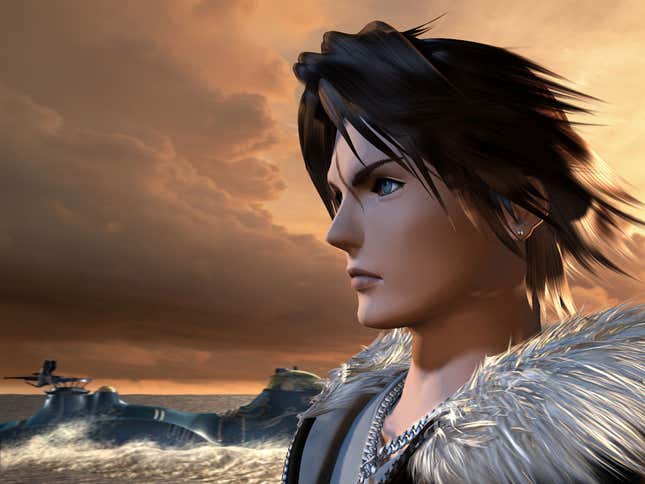
The story: Meet Squall, a stoic mercenary who seems to hate everyone in his life, particularly himself. Squall grows up in Balamb Garden, a training ground for child soldiers destined to join the mercenary group SeeD, alongside his asshole rival Seifer and his patient instructor Quistis. Along with fellow SeeD members Zell and Selphie, Squall goes on a mission to a city called Timber, where they help a resistance leader named Rinoa fight against the occupying army of Galbadia. Then they’re all given orders to assassinate the sorceress Edea (with whom the dickish Seifer has joined up) with the help of a sniper named Irvine.
The party’s assassination attempt fails, and eventually the six of them—Squall, Rinoa, Zell, Selphie, Irvine, and Quistis—get caught up in a war between Balamb and Galbadia. The conflict culminates in Squall’s group defeating Edea for real, only to discover that she’s actually pretty chill and was just being possessed by another sorceress called Ultimecia. Turns out Ultimecia can possess any sorceress, including Rinoa, who—surprise!—is a sorceress herself. Ultimecia manipulates Rinoa—shades of FFVII here—and uses her to free the imprisoned body of Adel, another sorceress. Ultimecia wants to accomplish a state called Time Compression, where she will be the only living person on the planet. After a whole lot of drama, Squall and crew stop her.
Also, Squall and Rinoa kiss in space, the party starts a band, and Squall and crew occasionally travel back in time and inhabit the bodies of Galbadian soldier Laguna and his two best pals. This game contains multitudes.
The main villain: Edea, a sorceress. No, wait, it’s Adel, a sorceress. Err, nevermind, it’s Ultimecia, a sorceress. Although Ultimecia is incredibly powerful and comes very close to succeeding at her goal of compressing the world—all of Disc 4 takes place on a partially time-compressed planet of her making—her motivations remain unclear. She’s evil, and she wants to stop SeeD, and that’s about it.
Seifer, on the other hand, is a far more tragic villain—an unloved orphan whose stubbornness, arrogance, and recklessness prevent him from succeeding in SeeD. After bullying his classmates, failing to graduate, and generally screwing things up for himself in every possible way, Seifer winds up serving Ultimecia as her lackey. Over the course of the game, he becomes more and more unhinged, his appearance growing disheveled to reflect his descent into depravity. As awful as he is, you just can’t help but feel sorry for him.
The gimmick: There are so many, but let’s talk about the Draw system. To use magic in Final Fantasy VIII, you have to collect it. Each spell is treated as an item, and you can collect different quantities of each, so you might have 90 Fires, 83 Cures, 12 Poisons and so on. There are a few ways to collect spells, but the main method is to “Draw” them from enemies. Everyone you fight carries a range of 2-4 different spells, and during combat, you can use the Draw ability to steal those spells for yourself. Then you can either use them or “junction” them to boost your stats, like strength or hit points, with the stat increase correlating to the number of spells you have. (99 Fires will give you a lot more extra HP than, say, 10.)
However interesting the system might sound on paper, it’s a tedious nightmare in practice. The problem is that using the Draw command takes up a character’s turn. Draw will generally get you between 1 and 9 of any given spell, so if you want to max out, you’ll have to spend turn after turn just standing around and stealing spells from enemies. It takes forever and is not fun. And because your stat boosts are linked to the number of each spell you have, it actually punishes you if you use the magic you’re taking.
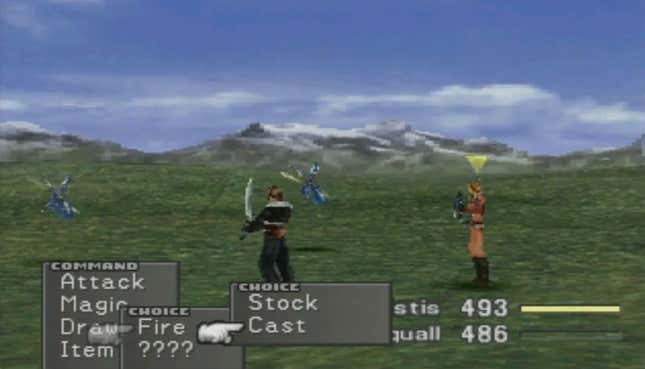
Oh, one more gimmick: All of your characters’ abilities come from summoned monsters called Guardian Forces (GFs) that you’ll collect throughout the game. Yes, this is a game about collecting GFs.
Best boss: Griever, Ultimecia’s GF and one of the final bosses of the game. In practice this guy is a pain in the ass, taking away your spells and whatnot, but lore-wise, he’s a manifestation of Squall’s perception of the “ultimate GF,” which I think is PRETTY COOL.
Most confusing boss: NORG, who finances SeeD and the Balamb Garden but also… lives in the basement? And is really mad because SeeD is trying to kill sorceresses instead of make him money? And then turns into an egg and eventually hatches after you kill him? It’s best not to think too much about this plotline.
Worst boss: During a mission to capture the nasty President Deling, Squall and crew find themselves fooled by a decoy, who taunts them for a while before turning into a boss battle. For all of his bluster, though, you can kill him in one turn. Just use a Phoenix Down.
Best mini-game: Triple Triad, a brilliant, addictive card game that set a new bar for what RPG mini-games should look like. What’s cool about Triple Triad isn’t just the pace, the strategy, and the fact that you can play it against hundreds of random NPCs across the world. What’s cool is that it helps you in combat. Using special GF abilities, you can refine cards into items and magic, taking your hard-fought rare cards and using them to stomp even the most difficult bosses. Also, there’s an entire subplot surrounding a group of card sharks at Balamb Garden, and it ends with a fun little twist.
Worst part of this mini-game: The fact that the rules change based on your in-game region, and that you can accidentally carry those rules with you as you travel the world. As you play cards across the planet, you might find yourself spreading awful rules to everyone you come in contact with, like a bad case of chlamydia. Random, which automatically picks your hand from your library instead of letting you pick your own cards, is the worst offender.
Best character: Squall, who drives a lot of people crazy but is actually a fascinating dude. Final Fantasy VIII is, more than anything, a coming-of-age story, showing us Squall’s journey from an insecure loner to a somewhat less insecure romantic. Throughout the game, we’re treated to a non-stop barrage of Squall’s internal thoughts about everyone around him, which are about as irritating as it would be if you cracked into the head of any 17-year-old boy. It makes for some interesting character contrasts, and even if Squall’s mopiness can get insufferable, it also makes sense with his character.
Over the course of the game, Squall realizes that he can’t live his life as a loner and needs to learn how to rely on other people. As he evolves, we the players learn what made him that way in the first place. He grew up in an orphanage and watched other families adopt his siblings, but nobody came for him. His closest friend and sister, Ellone, had to leave because people were worried about her powers of time manipulation (note: this is a Final Fantasy game), but nobody actually informed Squall of that, so he assumed she had abandoned him.
Replaying the game as an adult, I appreciated Squall’s growth as a character and his gradual love for Rinoa far more than I did when I was a mopey adolescent myself. I imagine many longtime Final Fantasy fans might feel the same way.
Worst character: Zell, a lunkhead who gets no such character development.
Best city: Esthar, a sprawling, futuristic metropolis that is protected by an invisible barrier but is nonetheless occasionally invaded by monsters.
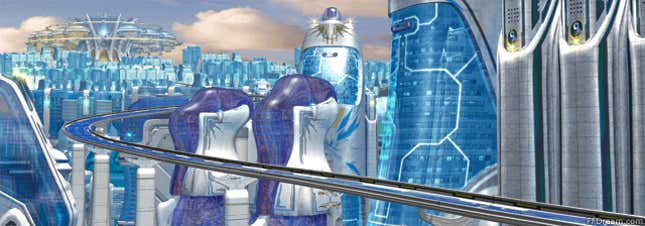
Fun fact: The Balamb Garden cafeteria is always out of hot dogs.
Best dungeon: Ultimecia’s Castle, a dungeon that’s unlike anything else in the game. When you enter Ultimecia’s Castle, your party will lose all of their abilities, and you’ll have to fight your way through bosses to gradually gain your powers back. It’s a challenging, satisfying gauntlet.
Best fan theory that isn’t actually true: Rinoa = Ultimecia, which producer Yoshinori Kitase shot down in an interview with me earlier this year. Runner-up: Squall’s dead, which Kitase also shot down. Sorry, fan theorists.
Most inexplicably bad map: In the city of Timber, early in the game, you can find a man who will let you see his map. This is what it looks like:
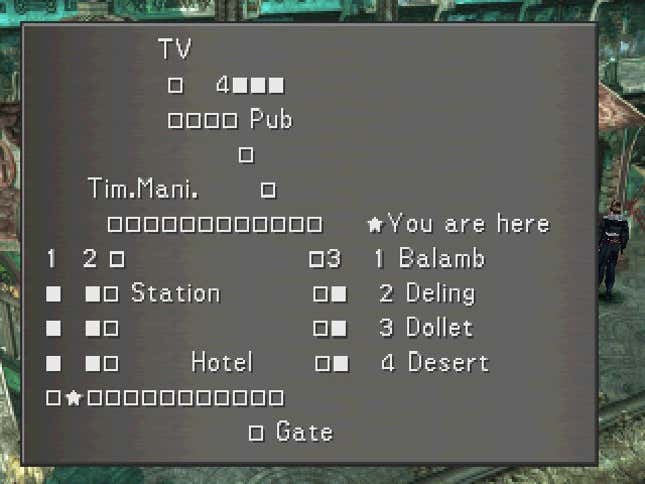
Best music: The Man With The Machine Gun
Most ridiculous looking character: Dr. Odine, whose character design I swear I’m not making up:
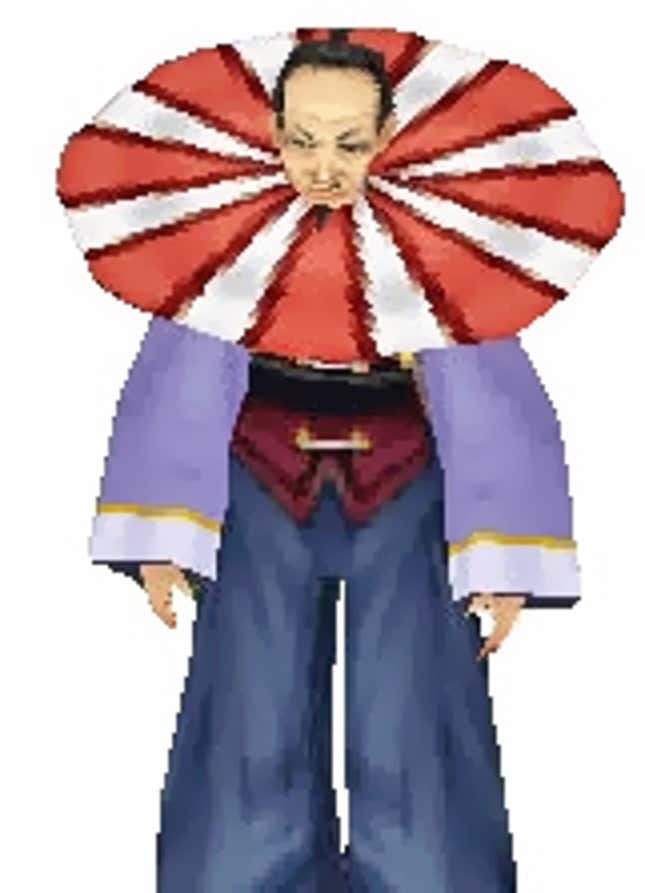
Best summon: Doomtrain, a train that is made out of doom.
Best plot twist: GFs actually erase your character’s memories. Specifically, they take up space in your brain where your memories should be. In other words, they cause CTE.
Best vehicle: About halfway through the game, Squall and crew will activate a special mechanism that uproots Balamb Garden from the ground, turning it into a mobile fortress. Then you can fly it around the map. That’s right, you can fly your school around the map. How can anyone dislike Final Fantasy VIII?
Meet Cid: This time, he’s the headmaster of Balamb Garden and husband to the sorceress Edea. At first he appears to be wise and benevolent, like a cross between Robin Williams and Dumbledore. As the game proceeds it becomes clear that he’s actually kind of clueless.
Best absurd minigame interlude: The part where you have to select instruments for all of your characters and… start a band?
Best catchphrase: “...whatever.”
Love story that won’t make you want to dislodge your brain from your skull: Video games, as a general rule, don’t do romance very well. JRPGs especially. Yet Final Fantasy VIII’s central love story is surprisingly competent. Because the entire game is built around Squall and Rinoa’s relationship, it winds up feeling very real—or about as real as a relationship can feel when it involves a man saving his girlfriend from being possessed by a time-traveling sorceress.
Does the game hold up? Yeah, mostly. The script has a few translation issues, and the Draw system never stops feeling tedious. You’ll also need a walkthrough if you want to figure out many of the game’s obscure secrets. The first time I played, I missed half of the GFs. Pro tip: Draw from every boss you find.
Next time: Shakespearean comedy...